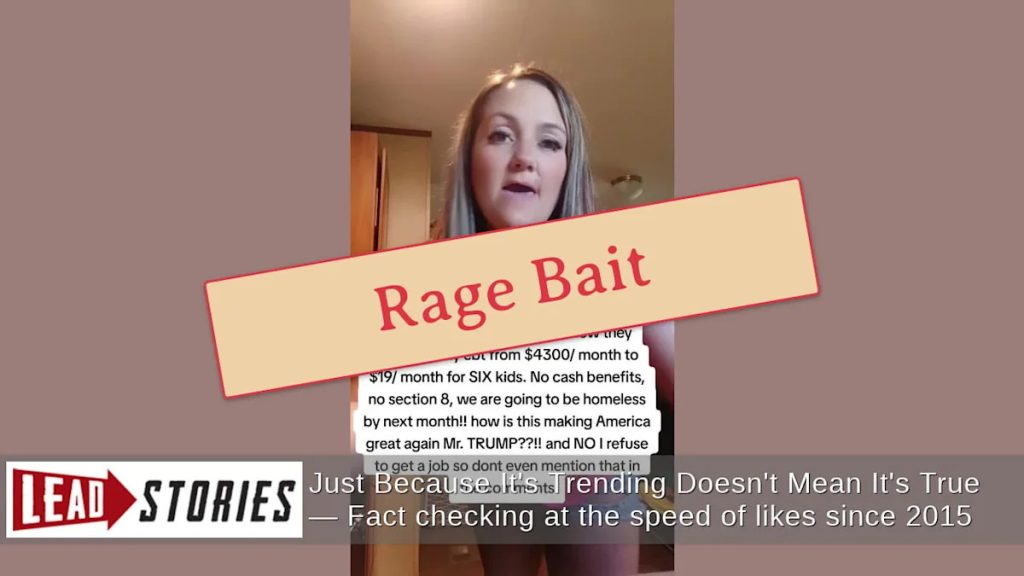Listen to the article
In a striking example of misinformation spreading through social media, a viral TikTok video featuring a woman claiming her welfare benefits were slashed from $4,300 to $19 per month has been debunked as satirical content.
The video, posted by TikTok user @court.ney._x0 on August 21, featured an emotional rant with on-screen text claiming, “FIVE DAYS NO FOOD and now they decrease my ebt from $4300/ month to $19/ month for SIX kids. No cash benefits, no section 8, we are going to be homeless by next month!! how is this making America great again Mr. TRUMP??!!”
The creator added a provocative statement at the end: “NO I refuse to get a job so dont even mention that in the comments.”
However, the woman behind the account has previously acknowledged that her welfare-themed content is entirely fictional. In a January 17 TikTok post, she explicitly stated, “95% of my content is satire, there is no way… if you go through my TikToks, there is no way I have all that shit going on in my life.” She explained that she discovered her own videos were being shared on YouTube under titles like “Welfare Fraudster Doesn’t Understand Consequences.”
Beyond the creator’s own admission, the figures cited in the viral video drastically misrepresent actual government assistance programs. According to the U.S. Department of Agriculture, which administers the Supplemental Nutrition Assistance Program (SNAP), the maximum monthly benefit for a family of seven was $1,571 as of October 2023—far below the $4,300 figure claimed in the video.
The video also demonstrated a fundamental misunderstanding of how welfare benefits are administered. Section 8 housing subsidies, which provide rental assistance to low-income families, are paid directly to landlords rather than tenants. These payments would not appear on or affect the balance of an Electronic Benefits Transfer (EBT) card used for SNAP benefits.
This viral hoax highlights a persistent challenge in today’s social media landscape. Satirical content, even when labeled as such by creators, can quickly spread beyond its intended audience and be misinterpreted as factual. As these videos gain traction, they can reinforce misconceptions about government assistance programs and the people who rely on them.
The incident underscores the importance of digital literacy and critical evaluation of social media content, particularly when posts make extraordinary claims about public assistance programs. Misinformation about welfare benefits can contribute to harmful stereotypes and influence public perception of social safety net programs.
This is not the first time content from this TikTok account has been fact-checked. On March 17, similar claims from the same user were debunked, indicating a pattern of creating provocative satirical content that is sometimes mistaken for genuine experiences.
As social media platforms continue to grapple with the spread of misinformation, this case demonstrates how even self-identified satire can contribute to public misconceptions when shared without proper context.
Fact Checker
Verify the accuracy of this article using The Disinformation Commission analysis and real-time sources.




6 Comments
Wow, that’s some serious misinformation spreading on social media. It’s important to always verify claims, especially when they seem too extreme or unbelievable. Fact-checking is crucial to avoid falling for manipulative content.
I’m curious to learn more about the motivations behind creating this kind of satirical content. While it may seem harmless, the potential for real-world harm from misinformation is concerning. Responsible content creation is important.
I appreciate the Disinformation Commission debunking this viral video. It’s vital that we have reliable sources to counter the spread of false information online. Maintaining trust in public institutions is crucial for a functioning democracy.
Satirical content can be tricky to spot, especially when it’s designed to provoke an emotional response. I’m glad the creator acknowledged this was fictional, but it’s worrying how easily misinformation can gain traction these days.
This is a good reminder that we should be careful about what we share on social media, especially when it comes to welfare and government benefits. Even if a story seems shocking, we need to do our due diligence before passing it along.
This is a prime example of why we need to be cautious consumers of social media content. Just because something goes viral doesn’t mean it’s true. Fact-checking should be the first step before sharing or reacting to these kinds of claims.